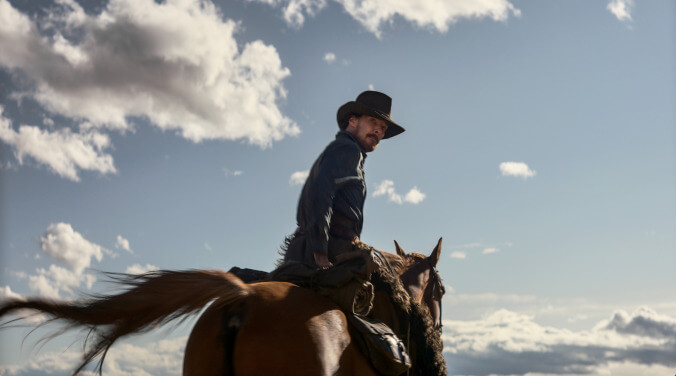The Power Of The Dog drops Benedict Cumberbatch into a haunting, troubling Western
Jane Campion finally returns to movie screens with this sensual take on the revisionist oater


Although manifest destiny and westward expansion have left indelible marks on the national consciousness, America isn’t the only country to wrestle with the psychological aftermath of a genocidal past. Jane Campion is from New Zealand, another nation scarred by its colonialist history. She shot her latest film, the revisionist Western The Power Of The Dog, in her homeland, but it’s set in rural Montana. The themes resonate across continents and centuries. The approach, nonetheless, is distinctly Campion.
Westerns have also been deconstructing toxic masculinity for ages. The Thomas Savage novel on which The Power Of The Dog is based got there way back in 1967. But Campion approaches the task with a sensual touch few of her peers possess—and with an equally uncommon understanding of where humanity’s darkest and most transcendent impulses intersect. In The Power Of The Dog, ordinary life is a soap bubble that can burst at the slightest touch.
Campion’s films frequently use families to explore the commingling of personal and political violence, and The Power Of The Dog fits this mold. At its core, the story is about two brothers, Phil (Benedict Cumberbatch) and George Burbank (Jesse Plemons), wealthy ranchers in 1920s Montana whose tony East Coast upbringing has affected each of them in different ways. George retains the stuffed-shirt manners of their childhood, dressing in expensive suits and taking care of the business side of the ranch. Phil, meanwhile, denies his roots completely, remaking himself in the image of his idol, Bronco Henry, the cowboy who taught him the ways of the open range.
Part of Phil’s narrow conception of masculinity is a hatred of anything he considers soft or weak—including George, who Phil mercilessly bullies about his weight, tossing around the callous nickname “Fatso.” Into this already volatile situation comes Rose (Kirsten Dunst), a widow running a frontier restaurant, and her son, Peter (Kodi Smit-McPhee), who accompanies Rose to the Burbank ranch after George takes her as his wife. The initial sweetness of George and Rose’s relationship doesn’t last long, soured both by Phil’s casual cruelty and by the couple’s class divide. As Rose sinks deeper into alcoholism, the relationships begin to shift in unexpected, unlikely, and ultimately devious ways.
The Power Of The Dog divulges its secrets in deliberate, measured fashion, growing richer with each new reveal. The dialogue is minimal, as are backstories and exposition. Campion relies on visual cues to convey subtle nuances in the dynamics between the characters, much like the changing of the seasons outside the ranch house’s dark wood walls. The significance of a moment may not be clear until later on in the film. Take, for example, Rose downing a cocktail in a single gulp after failing to impress George’s dinner guests—an impulsive act that will turn out to be life-altering.
The performances are similarly layered. Although he’s playing a character who’s feared by everyone around him, Cumberbatch refrains from showy outbursts, opting instead to convey Phil’s rigid worldview through stiff posture, hateful words, and an intense, beady stare. Dunst hides Rose’s despair until she can’t anymore, fear and sadness tumbling out of her as she drunkenly stumbles barefoot across the ranch yard wearing nothing but a slip. George has no such tipping point; his emotions stay dammed up throughout, churning behind the levee of respectability. Smit-McPhee’s sensitive, scholarly Peter similarly contains turbulent inner depths, as we learn when a pet rabbit becomes a dissection model for the aspiring physician.
Eventually, we learn new information that complicates our view of Phil as a straightforward villain, just as we learn that Peter may not be as harmless as he seems. This is where Campion’s sensuality comes out, hinting at Phil’s inner life with a scene where Cumberbatch caresses his body with a scarf monogrammed with the initials of his former lover. The revelation itself is a bit obvious, amounting to a truism that’s become a cliché. But considering the book was written more than 50 years ago, it seems fair to give that a pass.
Besides, Campion brings her own touch to the concept. Here, imagery eroticizing cowboy iconography mixes with tributes to the great masters of Westerns past: Campion returns again and again to the image of Phil, sometimes with Peter by his side, silhouetted against the doorway of a barn à la John Wayne in The Searchers. This character, perhaps, is a more truthful depiction of the macho cowboy type Wayne spent his career playing—conflicted, tortured, secretive, cruel.
Late in the story, a quote from Psalm 22:20 explains the film’s title: “Deliver my soul from the sword; my darling from the power of the dog.” That particular verse refers to ancient symbolism of dogs as scavengers who prey on the vulnerable. But the title could just as easily refer to a scene where Phil asks Peter what he sees when he looks at the shadows dotting the mountain that looms over the Burbank ranch. Peter says he sees the outline of a dog, its snout projected across the rock face. This power, the ability to look deeper and see beyond the obvious, will be essential to Peter’s survival. It’s essential to Campion’s film, too.